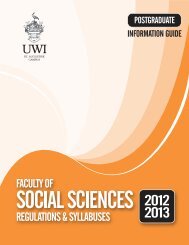Faculty of Humanities and Education (Postgraduate) - The University ...
Faculty of Humanities and Education (Postgraduate) - The University ...
Faculty of Humanities and Education (Postgraduate) - The University ...
Create successful ePaper yourself
Turn your PDF publications into a flip-book with our unique Google optimized e-Paper software.
108<br />
POSTGRADUATE REGULATIONS & SYLLABUSES 2012 - 2013<br />
THE FACULTY OF HUMANITIES & EDUCATION<br />
COURSE DESCRIPTIONS<br />
6.1 HEPR 6001 - <strong>The</strong> Health <strong>and</strong> Human Relationships<br />
Knowledge Base (4 credits)<br />
Course Overview<br />
Part 1: Nature <strong>and</strong> nurture – the social construction <strong>of</strong> health<br />
Just as the literature review is the indispensable basis for sound<br />
research, a sound evidence-base is an essential foundation<br />
for any discipline. In the case <strong>of</strong> programmes to work with<br />
controversial <strong>and</strong> highly stigmatized conditions (such as HIV<br />
<strong>and</strong> Sexually Transmitted Infections STIs) <strong>and</strong> for working with<br />
marginalized populations, starting with a sound knowledge<br />
base is obligatory. This unit, like the entire Master degree<br />
programme, is based on the premise that all knowledge is<br />
socially constructed <strong>and</strong> that it is never possible to separate<br />
nurture from nature without creating a false binary. This course<br />
will therefore cover both. Recognizing that knowledge is socially<br />
constructed lays the groundwork for reflexive evaluation <strong>of</strong> the<br />
students’ own values <strong>and</strong> attitudes, which will be encouraged<br />
throughout the course.<br />
Part 2: Sexual <strong>and</strong> reproductive health<br />
Within this unit there will be a special focus on sexual <strong>and</strong><br />
reproductive health. This sub-theme builds on the earlier<br />
material in the unit <strong>and</strong> develops it to a much greater level <strong>of</strong><br />
detail. <strong>The</strong> basis for this theme is to explore sensitive <strong>and</strong> taboo<br />
issues <strong>of</strong> sexuality, gender, <strong>and</strong> health more deeply. <strong>The</strong>re are<br />
several reasons for highlighting sexual health in this course: (1)<br />
there is an urgent need to strengthen the Caribbean response<br />
to the AIDS epidemic; (2) sexual health has been the most<br />
difficult element <strong>of</strong> HFLE to implement in the Caribbean to date;<br />
<strong>and</strong> (3) because <strong>of</strong> the complexities <strong>of</strong> this area, strong skills in<br />
sexual health promotion will be extremely useful in other areas<br />
<strong>of</strong> health promotion.<br />
OBJECTIVES<br />
At the end <strong>of</strong> the course, participants will be able to:<br />
• Demonstrate an underst<strong>and</strong>ing <strong>of</strong> the need for a reflective<br />
awareness <strong>of</strong> the dignity <strong>of</strong> the person, <strong>and</strong> how this value<br />
impacts on public policy <strong>and</strong> on an individual’s choice <strong>and</strong><br />
action<br />
• Demonstrate an underst<strong>and</strong>ing <strong>of</strong> the concept <strong>of</strong> health<br />
• Critically examine the determinants <strong>of</strong> health<br />
• Demonstrate an underst<strong>and</strong>ing <strong>of</strong> the colonial <strong>and</strong> postcolonial<br />
basis for health<br />
• Discuss the social contexts/social construction <strong>of</strong> health<br />
(including sexual health) in the Caribbean<br />
• Discuss gender issues in relation to health<br />
• Demonstrate an underst<strong>and</strong>ing <strong>of</strong> the milestones <strong>of</strong> human<br />
development from embryology through to ageing<br />
• Relate lifestyle practices to chronic non-communicable<br />
diseases <strong>and</strong> HIV/AIDs in the Caribbean<br />
• Apply basic biomedical knowledge to inform the<br />
development <strong>of</strong> health promotion interventions.<br />
• Demonstrate skills in framing biomedical explanations to<br />
suit particular social <strong>and</strong> cultural contexts<br />
• Demonstrate a reflexive awareness <strong>of</strong> stigma,<br />
marginalization, <strong>and</strong> discrimination, as they impact on the<br />
health <strong>and</strong> rights <strong>of</strong> individuals<br />
CONTENT<br />
• Human dignity<br />
• Perspectives on the construct <strong>of</strong> health<br />
• <strong>The</strong> nature/nurture debate<br />
• Determinants <strong>of</strong> physical, social, <strong>and</strong> mental health<br />
• Social construction <strong>of</strong> health in the Caribbean<br />
• Gender <strong>and</strong> health<br />
• Biomedical knowledge base – application <strong>and</strong> critique<br />
• Chronic non-communicable diseases <strong>and</strong> lifestyle<br />
practices<br />
• Stigma theory, marginalization, prejudice, discrimination,<br />
<strong>and</strong> human rights<br />
• Hum<strong>and</strong>evelopment&ëthe7ages’:embryology,childhood,<br />
puberty, early adulthood, ageing<br />
• Introduction to public health<br />
• Introduction to sexual health<br />
• Sexuality <strong>and</strong> health in Caribbean society<br />
• STIs / HIV/AIDS<br />
• People with HIV<br />
• Infertility <strong>and</strong> contraception, pregnancy,<br />
<strong>and</strong> parenthood<br />
• Sexual function <strong>and</strong> dysfunction<br />
Major competencies to be developed<br />
• Gain new perspectives on the relationship between nature<br />
<strong>and</strong> nurture<br />
• A spirit <strong>of</strong> enquiry into the relationship between social<br />
contexts <strong>and</strong> health<br />
• Reflexive <strong>and</strong> critical thinking in relation to social justice<br />
<strong>and</strong> health<br />
• A biomedical knowledge-base to underpin future health<br />
promotion work, including sexual health promotion.<br />
• Communication skills for discussing sexual health in a<br />
meaningful <strong>and</strong> accurate way<br />
• A practical <strong>and</strong> grounded underst<strong>and</strong>ing <strong>of</strong> the<br />
relationships between stigma, marginalization, <strong>and</strong> health<br />
<strong>and</strong> how these might affect health promotion<br />
ASSESSMENT:<br />
Coursework Assignment 40%<br />
Examination 60%<br />
Required reading<br />
Chevannes,B. (2001). Learning to be a man: Culture, socializtion<br />
<strong>and</strong> gender identity in five Caribbean communities. Mona:<br />
UWI Press. (ISBN: 976 640 092 X)<br />
G<strong>of</strong>fman, E. (1963). Stigma: Notes on the management <strong>of</strong> spoiled<br />
identity. Simone & Schuster. (ISBN: 06710622447)<br />
Kelly, M. J., & Bain, B. (2005). <strong>Education</strong> <strong>and</strong> HIV/AIDS in the<br />
Caribbean. Kingston: Ian R<strong>and</strong>le.<br />
Mac an Ghaill Mairtin (1994). <strong>The</strong> making <strong>of</strong> men: Masculinities,<br />
sexualities <strong>and</strong> schooling. Buckingham: Open <strong>University</strong><br />
Press. (ISBN: 0-355-15781-5)<br />
Reddock,R.ed. (2004). Interrogating Caribbean Masculinities:<br />
<strong>The</strong>oretical <strong>and</strong> empirical analyses. Kingston: <strong>University</strong> <strong>of</strong><br />
the West Indies Press. (ISBN: 062117110523)<br />
Weeks, J. (1985). Sexuality <strong>and</strong> its discontents. London: Routledge.<br />
(ISBN: 0-415-04503-7)

















